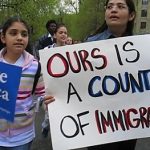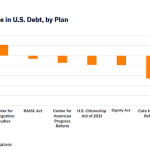
Walter Olson
Two years ago in Canada Prime Minister Justin Trudeau invoked the country’s Emergencies Act, a successor to what had been known as the War Powers Act, to break up trucker protests that had severely disrupted the capital city of Ottawa and temporarily blocked border crossings crucial to the national economy.
We took a highly critical view of Trudeau’s actions at the time, particularly of the “financial incapacitation” measures by which persons or businesses whose trucks were seen at the protest would be subject (it was announced) to bank account freezes and auto insurance cancellation decrees, all without a court order or even notice and a chance to respond. We cited critics who questioned whether Trudeau or deputy Chrystia Freeland had established that conventional law enforcement methods to quell the unlawful protests had been fully tried and shown futile.
Now a Canadian federal judge has agreed on every major point that the government’s actions were unlawful (opinion). The Canadian Civil Liberties Association, one of the complainants in the litigation, sums up the findings:
The Court concluded that:
The federal government’s decision to declare a public order emergency under the Emergencies Act in early 2022, as well as the associated regulations that it enacted, were unreasonable and were not justified on the facts or the law.
The regulations violated the Charter right to freedom of expression and the right to be secure against unreasonable search or seizure.
As I wrote at the time, the law need not and ought not to authorize or wink at the sorts of freeway‐blocking, downtown‐closing protest actions that upend the lives of unoffending third parties and block them from being able to get to their homes, churches, and places of work. But any resulting exercise of police powers must respect the limits set by (in Canada) the Charter of Rights or (here) the Constitution and Bill of Rights. Emergency declarations that purport to bypass or remove those safeguards are an extraordinary peril to liberty.
The CCLA puts it this way:
Emergency is not in the eye of the beholder. Emergency powers are necessary in extreme circumstances, but they are also dangerous to democracy. They should be used sparingly and carefully. They cannot be used even to address a massive and disruptive demonstration if that could have been dealt with through regular policing and laws. The threshold for invoking the Emergencies Act is extremely high.
We warned at the time that Americans should not be complacent about what was happening north of the border, because government could use many of the same methods here too.
That’s one reason, in amicus briefs and panel discussions and a dozen other ways, Cato scholars have warned for decades about the government’s accumulation of emergency powers.
In the Cato Handbook for Policymakers chapter on emergency powers, Gene Healy points out that infatuation with these powers is a bipartisan matter. The subject matter may differ from one administration to the next, from immigration rules and riotous protests to evictions during a pandemic or “climate emergency.” Loose talk of irregular executive action during the Trump administration often focused on the powers afforded the president by the dangerously vague Insurrection Act.
It’s a crying shame that there isn’t more of a bipartisan effort in Congress to revisit and tighten these emergency laws, which so often tempt presidents to bypass restraints on their power. Unneeded or obsolete emergency authorities should be identified and repealed, and both Congress (through time limits and sunsetting) and the judiciary, as appropriate, should be given a greater role in reviewing emergency declarations.
There should also be sanctions for abuse, with real teeth. As Healy writes, “The sooner, the better: you never know when a competent authoritarian is going to come along.”
Whether the Canadian actors in this drama count as competent authoritarians is a question we will leave to our northern readers. Freeland says the government intends to appeal.





